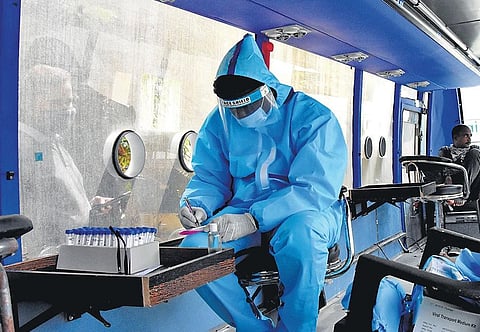

Using a Delphi method (process to arrive at group decision by surveying a panel of experts), thirty-nine Indians along with international respiratory experts have published a study in the International Journal 'Critical Care' addressing important grey areas in the management of COVID-19 related Acute Respiratory Failure (C-ARF).
The experts agreed on 27 management strategies including the use of corticosteroids, high-flow nasal oxygen and non-invasive ventilation.
"All international experts in intensive care, especially respiratory failure were part of the study led by Indians. It agrees on standard practices to be followed in India and worldwide, with a consensus among experts and scientific validation. C-ARF is a condition where the patient's lungs are severely affected and suffer inflammation. It is a dreaded complication, often leading to death," said Dr Pradeep Rangappa, Consultant, Intensive Care Unit, Columbia Asia Hospital and one of the authors of the study.
Lack of high-quality evidence on the respiratory management of C-ARF has resulted in wide variation in clinical practice.
Some of the recommended management techniques include systemic corticosteroids, with dexamethasone being the preferred choice. The daily dose of dexamethasone should be 6 mg and the preferred duration of systemic corticosteroids is 5-10 days.
The experts recommended awake self proning, a position where the patient lies on his stomach, to be done to improve oxygenation in patients with C-ARF who need supplemental oxygen.
"For example, lung-protective ventilation should be used for patients with C-ARF. Ventilation requires complex settings and this procedure involves settings that will protect the lungs and improve the recovery process," Dr Rangappa said.
Another strategy recommended is tracheostomy, where the timing of the procedure to facilitate weaning from mechanical ventilation should be the same as in non-COVID-19 patients. Tracheostomy is a procedure where a tube is put into a patient's windpipe by creating an opening in the neck.
"Intubation through the mouth can be done only for 10 days. If the patient requires ventilation even post that, tracheostomy should be done so the tube can be removed and kept back as needed," he explained.
The study titled Expert consensus statements for the management of COVID-19-related acute respiratory failure using a Delphi method states that some of these general principles may help with the management of other viral pneumonias or with future variants of the SARS-CoV-2 strain.
Dr Rangappa, who is part of the tele-ICU group monitoring high-risk COVID patients in Karnataka, said that many of these strategies have already been adopted by the state. This is the first such Delphi consensus study done on this topic, he said.